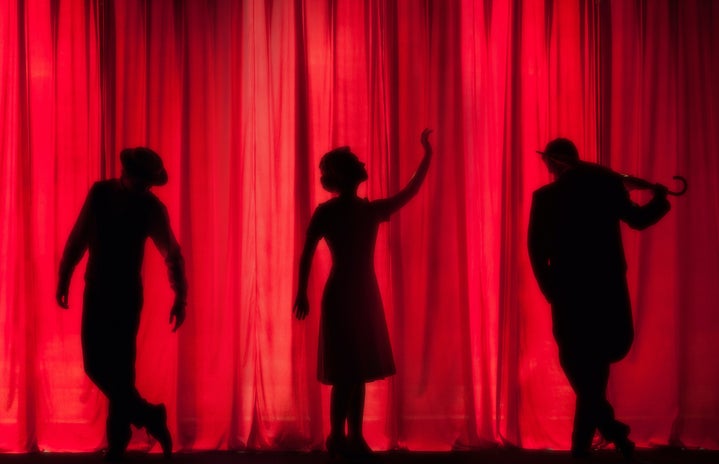This week, I was fortunate enough to interview the cast of the upcoming play “Jerusalem”. Led by an all-female production team I was keen, as a writer for Her Campus, to get an insider’s scoop on this exciting new production, which includes an amazing cast of actors, both first year and older students.
A Play of Deep Themes and Thoughts
Jerusalem, originally written by Jez Butterworth in 2009, tells the tale of a man about to be evicted from his caravan by the council of Kennet and Avon. While the premise may sound simple, the play delves into much deeper, eye-opening topics, relating to drug abuse and rave culture in England, toxic masculinity, the urbanisation of rural communities and the struggle of belonging and finding one’s place in society. Louisa Walsh, Producer of Jerusalem, discussed this last theme in depth, stating that a lot of people, particularly young persons, “could relate to this idea of not belonging and needing to escape somewhere,” thereby demonstrating the relevance and modernity of this play. Relatedly, Walsh highlighted how each of the characters, particularly the protagonist, are all flawed individuals, illustrating the interesting depth of the play. I don’t know about you, but when a play or show follows the same simple structure where there is a clearly defined hero and antagonist, I become bored easily, which is why I am super excited to watch Jerusalem and learn about each character and their dimensional personalities.
When interviewing the production team, I was particularly interested in the play’s combination of old and new. Kate Matthews, one of the Co-Directors of Jerusalem, elaborated on this topic, explaining that while Jerusalem touches on very modern themes, it also discusses topics like the rich history of England. This is particularly seen in the movement of the play, which displays both “rave/clubbing dancing” that most of us would be familiar with today, alongside traditional “Morris dancing”. This combination of old and new particularly intrigues me and gives me high hopes for the play, as it should for you! Whilst the audience learns about perhaps forgotten parts of English history, Jerusalem retains an element of relatability where one can feel connected to current, present-day scenes, such as dancing in a nightclub.
Behind the Scenes: A Production Team of All Females
Although the play itself is undeniably interesting, the production team of Jerusalem are individuals which deserve a shimmer of the spotlight. Composed of all females, I was particularly interested in learning more about the play’s production team.
When asked whether it was annoying to emphasise the gender of Jerusalem’s production team, rather than appreciating the team as in individuals, Lucy Yellow, one of the Co-Directors of Jerusalem, confidently asserted that “having a group of strong, driven women is absolutely incredible…and made a safe space which celebrates our talents as women”. Additionally, she stated that it is important to showcase an all-female production team and demonstrate that it “still isn’t normalised…and thus, celebrating the fact that we are all-female is something which should be celebrated”.
Eden Vaughan, Assistant Director of Jerusalem, also shared similar thoughts to Lucy, claiming that it is “great to honour the fact we are an all-female production team”. However, she did remark that it is also annoying at times that the gender of females, in all realms of life, whether that be the music industry, acting industry or even beyond that- such as in fields of science and technology, is constantly emphasised. In a final statement, Eden remarked “why does our gender constantly have to be acknowledged?”.
These statements stress the conflict between celebrating women’s achievements and trying to normalise them. The “correct” stance, if there is any, to be taken in this situation is unclear and is up for you to decide. Nevertheless, I think it is safe to say that the production team of Jerusalem have put an amazing level of effort into this production and it is a spectacle worthwhile seeing.
Final Words from the Cast: Why You Should See Jerusalem
So, in summary, why should you come and see the show? I asked members of the production team to summarise their responses in three words and here’s what they came up with:
After pondering for several seconds, probably as it is so difficult to summarise the complexity and grandeur of this play into three simple words, Louisa Walsh (Producer of Jerusalem) narrowed it down to “mystical, passion and laughter”. She elaborated that passion refers to the immense effort and time invested into the play and how such hard work will be reflected into the play’s finished production. Therefore, if you’re keen to watch the play, expect a well-produced and executed production.
Lucy Yellow (Co-Director of Jerusalem) selected her three words to be “joyful, exuberant and vibrant”. While, as discussed before, Jerusalem does discuss dark, important themes, Lucy’s summary aims to accentuate the humorous, entertaining side of Jerusalem. More specifically, Lucy stated the play encapsulates “British humour” and is perfect for those who enjoy a “witty, intelligent comedy”. So, if you’re keen for a laugh and to generally be entertained, buy a ticket, and come and see the show! Lucy was also keen to the highlight the high level of training provided to the actors of Jerusalem, who were involved in a variety of training styles, particularly intimacy training and workshops. She believes this training, particularly as it was led by females, made the actors feel extremely empowered. Additionally, the use of non-sexualised language during intimacy training provided for a very cathartic process which was sensitive to actors’ mental health, leading to an ultimately high-quality production.
After interviewing some of the cast of Jerusalem and learning more about not only the play, but the team behind its production, I cannot wait to sit down and see the final production. Maybe after reading this, perhaps you would be keen too? I couldn’t see why not, as Jerusalem is a play for all, combining both old and new, touching on deep themes, while also drawing a laugh out of you.
All I can say is, you’d be stupid to not buy yourself a ticket and come and see, in the words of Eden Vaughan (Assistant Director of Jerusalem), what is a “proper spectacle”.
Written by: Elena Goss
Edited by: Michele Ngue-Awane


